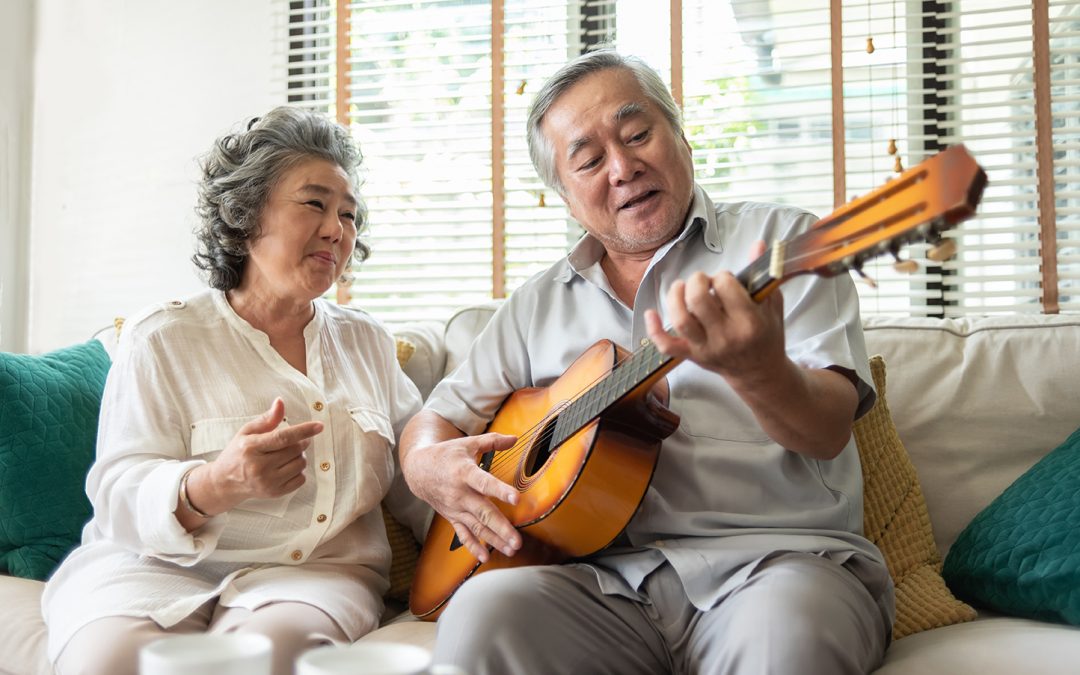Music therapy for seniors can have tremendous benefits. Enjoying the relaxing times spent after retirement? After a life of busy work, the slow and tranquil pace of retirement might have you longing for something to do. Learning how to play a musical instrument is an ideal activity that provides more advantages than just a hobby to pass the time.
Music Therapy – Learning a Musical Instrument
Ennui is often a constant companion of many seniors that are enjoying the relative ease of retirement at their own home. Unfortunately, boredom is not as trivial an issue as it might initially seem, as it can lead to:
- Restlessness
- Depression
- Loneliness
- Physical deterioration
- Negative outlook
Worse still, these conditions resulting from plain boredom can further progress into more serious concerns. Playing a musical instrument is a great way to focus and alleviate boredom from everyday retirement life, which can be as dull as it is easy and relaxing.
Play the Blues to Beat the Blues
Defeating boredom is not the only benefit of learning to play musical instruments. You can just as easily play jazz or the blues to beat feeling down or blue. Feelings of loneliness and melancholy are typical for any senior who lives alone. Wallowing in these unhealthy emotions, however, is certainly not recommended.
The process of learning the ins and outs of music and an instrument is already an effective weapon to keep negative emotions at bay. In fact, once you learn how to play and express yourself emotionally, spiritually, and creatively, there is a sense of fulfillment that banishes feelings of being lost and sad.
How Music Therapy Prevents Mental Ailments in Seniors
Scientific research has linked the process of learning an instrument or the study of music to real-time stimulation of specific areas in the brain. To get to the point, playing instruments and learning music helps keep a sharp memory.
This, interestingly, leads to more benefits. Enriching the parts of the brain associated with memory also have positive impacts on preventing diseases such as Alzheimer’s as well as fending off some forms of dementia, which seniors are more prone to procuring.
Music Therapy Can Improve Coordination, Eyesight, and Hearing
As we age, we gradually lose physical attributes that had once allowed us sharp hearing, clear eyesight, and accurate coordination. Though like our muscles, with appropriate and adequate exercise, we can tone and hone these facets to become better. Playing a musical instrument is very good exercise that does just that.
Scientifically, it was found that playing music helps the body produce a hormone that plays an essential role in slowing the aging process. So not only do you retrain your eyesight, hearing, and coordination, you also slow down the march of time.
Belong to a Group of Like-Minded Seniors Who Play Musical Instruments
Every human being has a need to belong, and this sense of belonging is often quite keen amongst seniors. If the opportunity presents itself, groups of like-minded seniors can band and bond together to form families within their community through music. Perhaps a caregiver is musically-inclined and can play or sing along.
Being in a group of musicians or musical enthusiasts brings a sense of belonging that presents significant benefits, such as contributing to the improvement of the quality of life. In the age of retirement and later years, that is what it is all about: savouring the quality of life.
Some people might look at learning how to play a musical instrument as an activity best done when still a child. Post-retirement, however, there are just as many benefits to musical learning at home as there are in a classroom or private tutor’s study. When it comes to music therapy for seniors, it is never too late to pick up a musical instrument.



